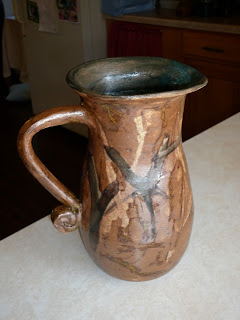Even now, six days into our cultural immersion, jet lag still rears its ugly head. I’m exhausted.
With little else to do in the wee hours before the sun rose this morning in Bangkok, I stumbled upon some words of St. Thérèse of Lisieux, which I meditated on all day: "Love proves itself by deeds, so how am I to show my love? …The only way I can prove my love is by scattering flowers and these flowers are every little sacrifice, every glance and word, and the doing of the least actions for love."
Mid-morning, our cohort trotted off at a brisk walk to meet with a representative from the Thailand Burma Border Consortium (TBBC). Upon turning down a rough-looking alley, we were bid into the TBBC office by a Danish woman named Mette, who invited us to slip out of our shoes and into a back room, where we spent the next few hours discussing the plight of displaced and refugee Burmese citizens. We learned that over 73,000 people were displaced from their homes in Burma in 2010 alone, and that military forces in the country continue to turn their aggression upon their own people daily in what is essentially the longest-running civil war in world history. I was struck by how little the numbers seemed to me to be mere statistics, but instead were representative of actual struggling people; real people who are finding themselves uprooted from their villages, given the choice between fleeing the country, being herded into refugee camps on the Thailand border, hiding out at their own risk, or facing death.

My gut reaction almost immediately went something like this: That’s it. I’ve got to learn Burmese, move to Thailand, and help these people. Though something tells me this is a natural reaction and probably not the best solution to the problem, courageous people like Mette are doing this every day. When we asked her why she chose to come work for TBBC, she said that she wanted to spend her life working toward something good, rather than simply working for a paycheck to give herself a better life. I admire that.
Lately in our reflection times, we’ve been discussing how to express glory to God within our personal context in the here and now. This is something that I’ve wrestled with for a while, and it seems somehow all connected— and the only conclusion I have come to for myself is that the best way I can glorify God in the present is by, as St. Thérèse says, scattering the flowers of every little sacrifice, every glance and word, and the doing of the least actions for love. Here I am, two hundred years later, on a different continent and in a different context, and Thérèse’s words stretch through time to remind me that glorifying God does not entail grandiose gestures, but instead simply involves recognizing God in others, whether they are Burmese refugees, the professors who have taken the time and energy to lead us on this journey, or even one another as seminary students and servants of the Gospel of the Kingdom.

We enter into Burma tomorrow. Our pilgrimage is half over. Many of us are tired and overwhelmed with the knowledge we are receiving. Some of us haven’t gotten much sleep. Some of us perhaps feel that our western comfort has been invaded with the introduction of this newfound empathy for the marginalized Burmese. I know I personally have struggled to find my place in all this—as a fellow human
and as a person of faith. The resounding question I’m left with when all this is stripped away is simply What now?
It’s not a question I can even begin to answer here for myself or anyone else.






















